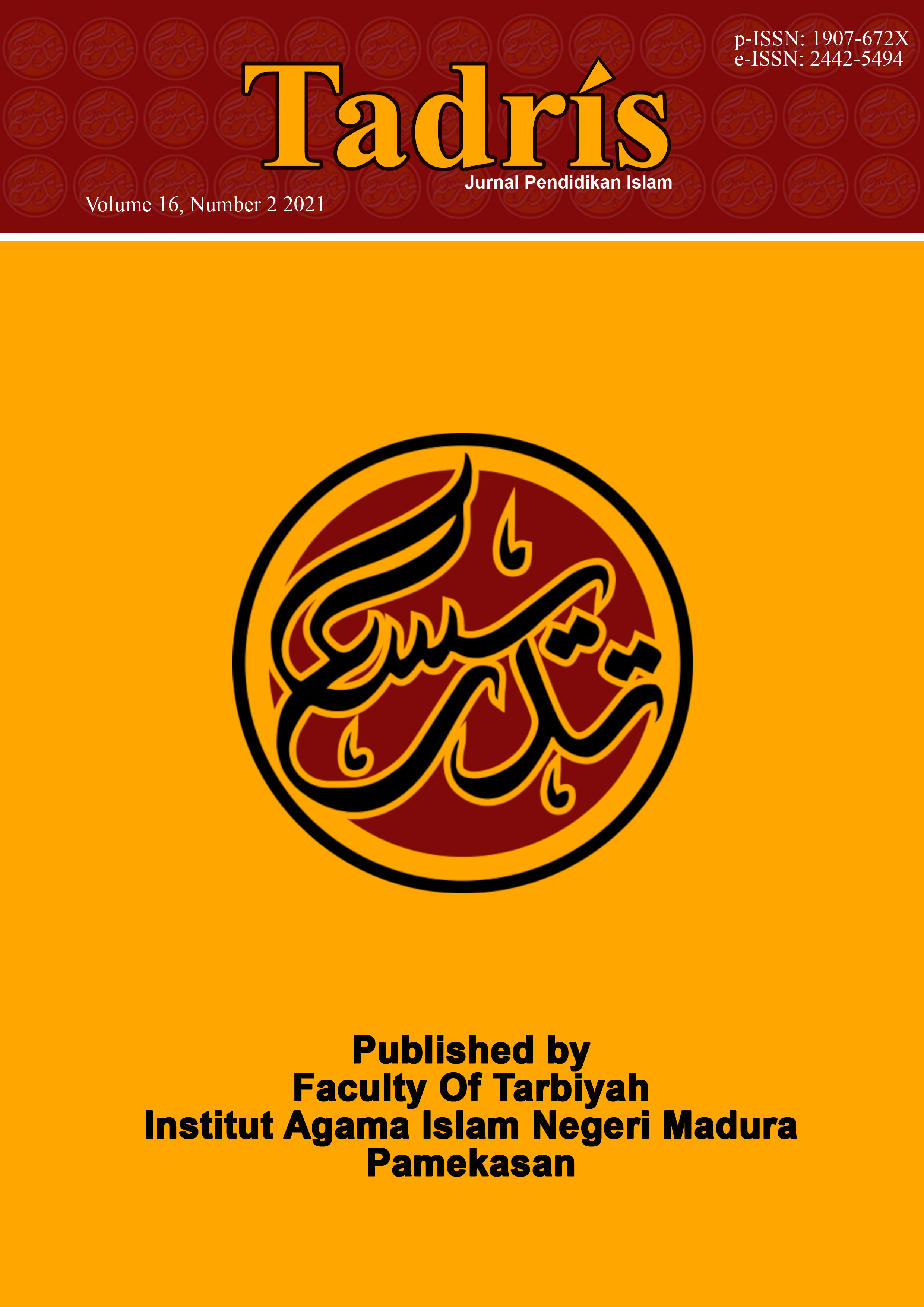Rekonstruksi Pendidikan Berbasis Dakwah Entrepreneurship di Pondok Pesantren Nurul Haramain Narmada dalam Dimensi Al Qur'an
 Abstract views: 189
,
Abstract views: 189
,
 PDF downloads: 182
PDF downloads: 182
Abstract
Humans are given the power to navigate this nature so that they can benefit from this natural wealth such as by cultivating tilapia. Not only fish farming, humans can get results, but also with trade or commerce which for the students of the Nurul Haramain Narmada Islamic boarding school by forming a boarding school cooperative, and cultivating agricultural land, so that entrepreneurship or entrepreneurship has a positive impact on the students of the Nurul Haraimain Islamic boarding school and has positive implications for the surrounding community. God has bestowed various favors, besides humans being able to enjoy natural resources, the produce of the earth can also be used as a means of connecting between regions. This is how God bestows on humans to worship Him and achieve prosperity in life. The use of natural resources discussed in the Qur'an is a form of depiction of entrepreneurs or entrepreneurs as achieving balance in human life in the world and the hereafter, therefore entrepreneurship-based education is very important to be practiced, especially in the Nurul Haramain Narmada Islamic boarding school and it turns out that entrepreneurship-based education have a positive impact both among students and the surrounding community.
Downloads
References
Creswell, John W., Research Design: Pendekatan Kualitatif, Kuantitatif, dan Mixed. Yogyakarta: Pustaka Pelajar, 2010.
Departemen Agama RI. Al-Qur’an dan terjemahan. Bandung: Diponegoro, 2010.
Dhofier, Zamakhsari. Tradisi Pesantren: Studi tentang Pandangan Hidup Kiai. Jakarta: LP3ES, 1982.
Dhofier, Zamakhsari. Tradisi Pesantren: Studi tentang Pandangan Hidup Kiai. Jakarta: LP3ES, 1982.
Ferawati. Entrepreneurship santri di Pondok Pesantren entrepreneur al-Mawaddah Honggosoco Jekulo Kudus (Studi living Qur’an), diakses dari http://eprints.stainkudus.ac.id/468/ pada tanggal 8 Agustus 2021 pukul 23.15 WIT
Ferawati. Entrepreneurship santri di Pondok Pesantren entrepreneur al-Mawaddah Honggosoco Jekulo Kudus (Studi living Qur’an), diakses dari http://eprints.stainkudus.ac.id/468/ pada Tanggal 28 April 2021 Pukul 23.15 WIT
Galba, Sindu. Pesantren Sebagai Wadah Komunikasi. Jakarta: PT. Rineka Cipta, 2004.
Hasbullah, Sejarah Pendidikan Islam di Indonesia: Lintasan Sejarah Pertumbuhan dan Perkembangan. Jakarta: PT. Raja Grafindo Persada, 1999.
Madjid, Nurcholish. Bilik-bilik Pesantren; Sebuah Potret Perjalanan. Jakarta: Paramadina, 1997.
Margahana, Helisia & Eko Triyanto “Membangun Tradisi Enterpreunership Pada Masyarakat”, Edunomika, Vol. 03, No. 02, (Agustus, 2019).
Moleong, Lexy J., Metodologi Penelitian Kualitatif. Bandung: Remaja Rosda, 2004.
Mubarok, Achmat. “Pendidikan Entrepreneurship Dalam Meningkatkan Kemandirian Santri Pondok Pesantren Al-Hidayah II Sukorejo Pasuruan”, al Murabbi, Vol. 4, No. 1, (Juni, 2018).
Nata, Abuddin. Perspektif Islam tentang Hubungan Guru Murid. Jakarta: PT. Raja Grafindo Persada, 2001.
Observasi, Pondok Pesantren Nurul Haramain Narmada Lombok Barat, 25 Juli 2021, Pukul 9.27 WIT
Setiawan, Heri Cahyo Bagus “Kontribusi Praktik Kewirausahaan di Pondok Pesantren (Studi Pada Pondok Pesantren Entrepreneur Mukmin Mandiri, Waru Sidoarjo)”, Jurnal Riset Entrepreneurship, Vol. 2, No. 2, (Agustus, 2019).
Shihab, M. Quraish. Berbisnis Dengan Allah. Jakarta: Lentera Hati.
Shihab, M. Quraish. Tafsir al-Misbah; Pesan Kesan dan Keserasian Al-Qur’an. Jakarta: Lentera Hati, 2000.
Sigit Wahyono, Inovasi Hidden Curriculum Pada Pesantren Berbasis Entrepreneurship (Studi Kasus di Pondok Pesantren Al-Isti’anah Plangitan Pati), diakses dari http://eprints.walisongo.ac.id/3263/1/ 3105129_Coverdll.pdf pada Tanggal 02 Mei 2021 Pukul 23.22 WIT
Soebahar, Abd. Halim. Modernisasi Pesantren: Studi Transformasi Kepemimpinan Kiai dan Sistem Pendidikan Pesantren. Yogyakarta: LKiS, 2013.
Suhartini, Problem Kelembagaan Pengembangan Ekonomi Pondok Pesantren; Dalam Manajemen Pesantren. Yogyakarta: Pustaka Pesantren, 2005.
Suryana, Kewirausahaan Pedoman Praktis: Kiat dan Proses Menuju Sukses. Jakarta: Salemba Empa, 2006.
Wahid, Abdurrahman. Menggerakkan Tradisi, Essai Pesantren. Yogyakrta: LKIS, 2007.
Ziemek. Manfred. Pesantren Dalam Perubahan Sosial. Jakarta: P3M, 1999.
Copyright (c) 2021 TADRIS: Jurnal Pendidikan Islam

This work is licensed under a Creative Commons Attribution-NonCommercial 4.0 International License.
The journal operates an Open Access policy under a Creative Commons Non-Commercial 4.0 International license. Authors who publish with this journal agree to the following terms:
- Authors retain copyright and grant the journal right of first publication with the work simultaneously licensed under a
 Commons Attribution-NonCommercial 4.0 International License
Commons Attribution-NonCommercial 4.0 International Licensethat allows others to share — copy and redistribute the material in any medium or format, and adapt — remix, transform, and build upon the material.
- Authors are able to enter into separate, additional contractual arrangements for the non-exclusive distribution of the journal's published version of the work (e.g., post it to an institutional repository or publish it in a book), with an acknowledgement of its initial publication in this journal.
- Authors are permitted and encouraged to post their work online (e.g., in institutional repositories or on their website) prior to and during the submission process, as it can lead to productive exchanges, as well as earlier and greater citation of published work (see The Effect of Open Access).














